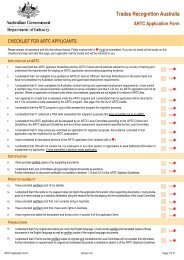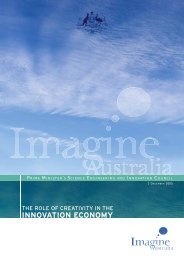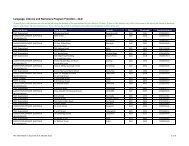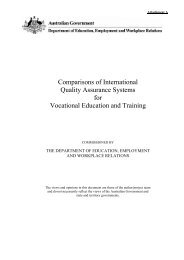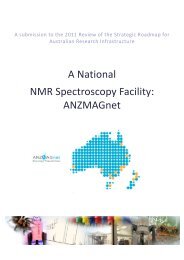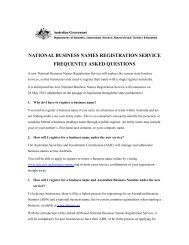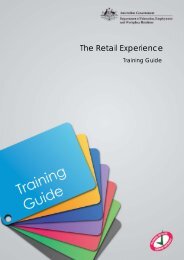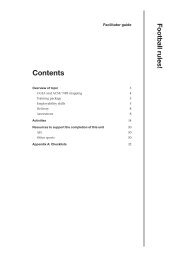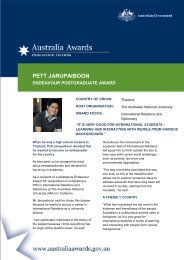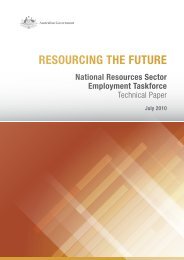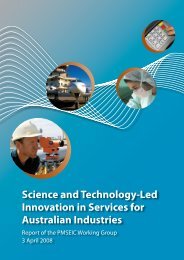National Survey of Research Commercialisation - Australian ...
National Survey of Research Commercialisation - Australian ...
National Survey of Research Commercialisation - Australian ...
Create successful ePaper yourself
Turn your PDF publications into a flip-book with our unique Google optimized e-Paper software.
And there are other benefits. The system’s use can improve a project’s community<br />
relations by providing a quick response to new constraints arising from the consultation<br />
process, and it can also factor in issues that produce better environmental outcomes.<br />
PRODUCT SUCCESS STORIES<br />
SEEING MACHINES<br />
Your car will soon be able to warn you if you’ve dozed <strong>of</strong>f at the wheel, not only saving<br />
you and your passengers, but also the thousands <strong>of</strong> other people killed or injured by<br />
sleeping or inattentive drivers around the world each year. Not to mention saving some <strong>of</strong><br />
the $3 billion each year in costs directly attributable to fatigue-related road accidents in<br />
Australia alone.<br />
The installation <strong>of</strong> fatigue warning systems in cars is now only three to five years away<br />
thanks to an eye-tracking system called ‘faceLAB’, which was developed by a commercial<br />
spin-<strong>of</strong>f from the <strong>Australian</strong> <strong>National</strong> University, Seeing Machines Pty Ltd. The<br />
Canberra-based company has been operating only since 2000, yet the automotive and<br />
electronics giants that have already bought ‘faceLAB’ include Bosch, DaimlerChrysler,<br />
Mitsubishi, Motorola, Nissan, Toyota and Volvo. Some have bought several, even though<br />
each unit costs up to $80,000.<br />
The original research at the ANU which produced ‘faceLAB’ was supported by an ARC<br />
grant in 1995 and 1996. Indeed, ‘ARC funding was vital to the early development <strong>of</strong> this<br />
technology at the ANU — “faceLAB” would not exist without it’, says the company’s<br />
International Market Developer, Gavin Longhurst.<br />
Seeing Machines, which was recently awarded the 2002 Eureka Prize for Information<br />
and Communications Technology Innovation, was founded by its CEO, Alex Zelinsky,<br />
a former Pr<strong>of</strong>essor <strong>of</strong> Robotics in the ANU’s Faculty <strong>of</strong> Engineering, and now employs<br />
20 people. ‘Our two main investors are the ANU and Volvo, which collaborated on the<br />
original research,’ says Mr Longhurst.<br />
In the past, observation <strong>of</strong> driver behaviour was subjective, laborious and frequently<br />
imprecise, with analysis prone to error. By contrast, ‘faceLAB’ is a computer vision<br />
research tool that allows driver behaviour to be objectively observed, measured and<br />
recorded. It is capable <strong>of</strong> registering even the tiniest <strong>of</strong> eye movements that betray driver<br />
fatigue or distraction. It is being used not only to develop driver warning systems, but<br />
also to intercept car design problems before they reach the road, and to supply evidence<br />
for legislative decision processes.<br />
In addition to this, and generating revenue for Seeing Machines and its investors,<br />
‘faceLAB’ has another important use — stopping the brain drain. As Mr Longhurst says:<br />
‘We’ve shown that it’s not just places like MIT or Stanford that can spin <strong>of</strong>f commercially<br />
successful enterprises — <strong>Australian</strong> universities can too.’<br />
65



